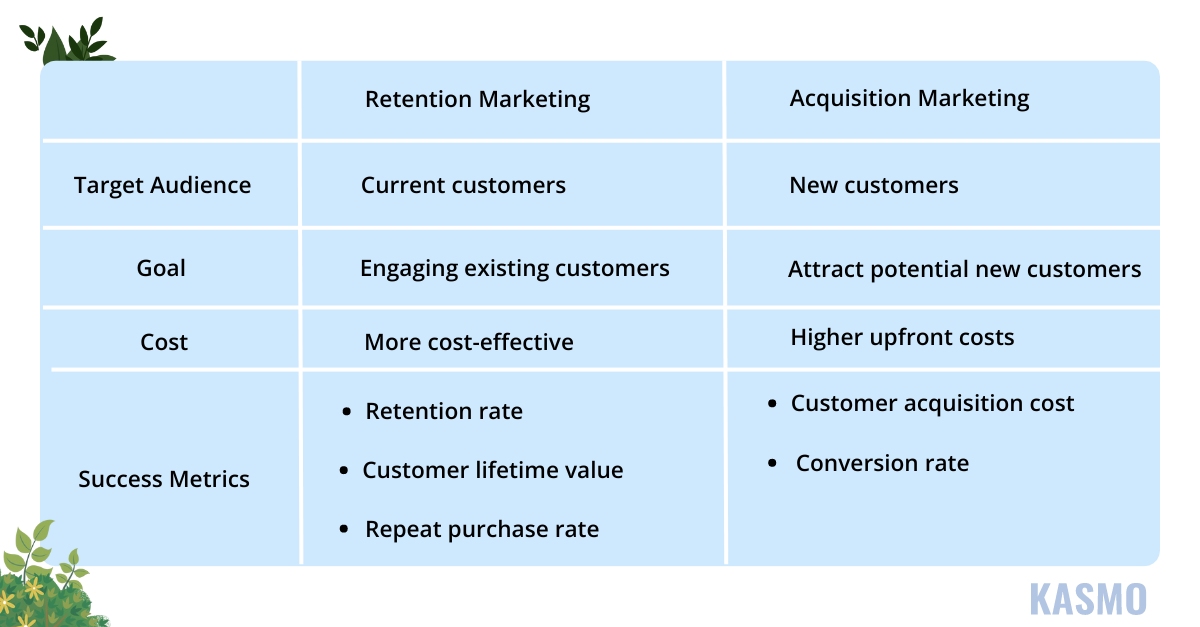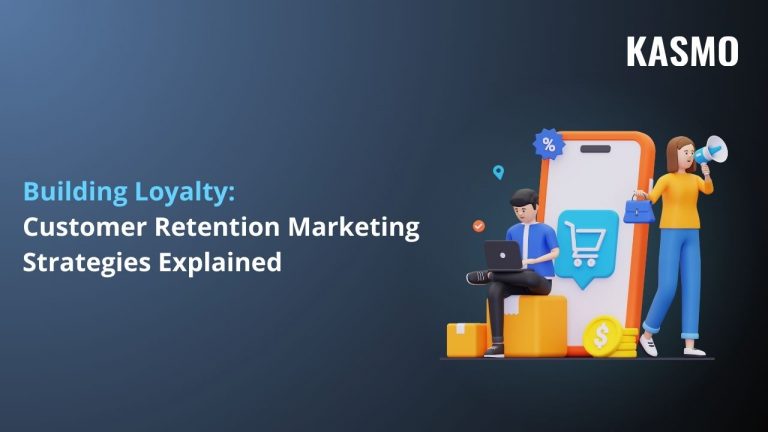Introduction:
Customer retention marketing strategies are indispensable for maintaining long-term customer relationships and sustained business growth. With a customer retention plan, businesses can ensure their customers are satisfied with the products and services. By focusing on improving customer retention, businesses can provide targeted offers and discounts to their customers, increasing satisfaction and decreasing customer churn.
The insights gained from customer data can be used by companies to proactively predict the needs of their customers. According to a 2023 survey conducted by Statista, 78% of customers discover aspects that can make them loyal towards a brand. Additionally, tailoring customer experiences enhances the chances of building customer loyalty. Using customer retention tools can turn your customers into brand advocates which ensures steady growth and lasting success. Implementing customer retention strategies helps you build a powerful foundation in this competitive market.
Why Customer Retention Marketing Strategies Need to be Implemented on Existing Customers Over New Customers?
There are numerous benefits to a company that takes care of its long-term customers. Firstly, the more they remain loyal to the company, the more they become involved. If a customer feels at ease with a company’s brand promises and pricing, they usually return to the company, and sometimes come back with friends, family and colleagues who are potential customers.
In addition to that, customers who enjoy the company’s products or services on a given occasion often give positive feedback to their friends. This type of advertisement from existing and targeting consumers can greatly improve the brand equity of the firm.
On the other hand, the conversion of new customers into brand advocates is significantly challenging. Even with the best customer retention tools, it is difficult to determine the number of new customers returning for business again.
Difference Between Retention Vs. Acquisition Marketing

What is the Importance of Developing Customer Retention Marketing Strategies?
It is critical for firms to establish good customer retention strategies to attract customers. Businesses need to implement good customer retention programs to build strong brand loyalty. Implementing good customer retention techniques can build interests and support of customers.
Having a good customer retention plan can help you stay relevant in this highly competitive market. You can build this plan through email campaigns, regularly engaging with customers through social media channels, creating tailored experiences, providing discounts and special offers to your customers.
Your customers will become more loyal towards your brand by recognizing them through social media channels, trade fairs and creating a niche community. If you are planning to rebrand your business, or change some products and services, always inform your customers.
This will show that you are prioritizing them and keeping them informed about your next business enhancements. It makes them feel important and valued. This makes it easier to develop trust and loyalty.
Top Customer Retention Marketing Strategies: A Roadmap for Business Success
Customer loyalty is important to achieve business success. Here’s a comprehensive guide to effective customer retention strategies:
Build Customer Loyalty Through Shared Values:
Engage with your customers as much as possible. Share your business plans and ask for feedback. This will help you gain insights on customer behavior, and they will feel valued. All these measures will help in building trust and loyalty towards your brand.
Frequently Ask for Feedback:
Make it a routine to engage get feedback regarding your products and services. Both positive and negative feedback are important for business growth. Conduct surveys to gather insights on customer behavior patterns and demands.
Update Your Products or Services:
Maintain your customers’ interest by updating your products and services and providing a diverse range of products and services to your customers. It will also increase the chances of new lead generation. For example: Company A specializes in selling eco-friendly soaps. If this company releases a new product almost every quarter, their customers will be invested in learning about the new products, and they are likely to recommend the new products to their friends and family.
Treat Customers as Individuals:
Get past automated responses from AI chatbots and respond to their queries through customer service professionals. Utilize the power of AI to automate mundane or manual tasks. This way, customers feel heard as individuals rather than numbers, thereby deepening their connection with your business.
Ensure Clarity in Communication:
While you are planning advertising or any marketing campaigns, keep in mind that those must be easy to understand, catchy and interesting. Using too much jargon cannot communicate your idea to your customers. Keep the tone conversational and light.
Offer Quick Delivery Options:
To customers who are keen on getting their orders faster, give them options for faster delivery. Faster shipping services separate your business from others.
Simplify Returns and Refunds:
The returns and refunds need to be made easy so that your customers are assured, and they can come and shop with you again. You can promote customer satisfaction and loyalty with simpler policies.
Encourage Word-of-Mouth Support:
Encourage word-of-mouth marketing to your customers. This type of customer marketing strategy will help you get new leads and help you retain old customers.
Create a Positive Brand Association:
This means that every time customers engage your brand you make them feel proud to be associated with it. Customer retention programs like investing in charities or adopting environmentally friendly practices add the much-needed value, making them more brand loyal.
Build Detailed Customer Profiles:
Study your long-term consumers so you understand their tastes and demands. Based on this information, it will be possible for you to conduct direct marketing campaigns and personalized email marketing campaigns.
Incorporate Rewards:
Capture customer’s attention through rewarding experiences of the product that is purchased. Offers like the accumulation of points, discounts and fun engagements, help to enhance the shopping experience, and attract customers to your business.
Become Difficult to Replace:
Provide unique experiences or special products that are not easily imitable by your competitors. This strategy is very useful to retain the customers because they do not find anyone else who can provide the same service as your business.
Conclusion
Customer retention marketing strategies are crucial for cultivating long-term relationships and ensuring sustained growth in a competitive market. By focusing on retaining existing customers rather than solely acquiring new ones, businesses can leverage loyalty to drive further engagement and organic promotion.
Implementing strategies such as frequent feedback solicitation, personalized interactions, and clear communication not only enhances customer satisfaction but also builds a strong foundation of trust and reliability. This approach transforms customers into brand advocates, fostering a positive cycle of retention and recommendation that contributes to overall business success.
Incorporating a variety of retention strategies, from offering quick delivery and simplifying returns to creating rewarding experiences and building detailed customer profiles, ensures a holistic approach to maintaining customer loyalty.
By continually adapting and refining these strategies based on customer feedback and market trends, businesses can stay relevant and competitive. Prioritizing customer retention helps companies not only retain their customer base but also turn them into enthusiastic supporters who are more likely to contribute to long-term growth and success.



